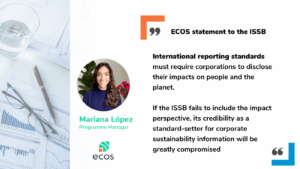Civil society calls for impact data, Paris-aligned targets and transition plans, and a holistic approach to sustainability in global reporting standards
The next months are key to determining what kind of sustainability data companies will disclose. To transform into an economy within planetary boundaries, we call on the ISSB to develop standards that require reporting on impact data, go beyond climate, and ensure climate-related disclosures are sufficiently granular to be meaningful.

Following a public consultation closed this summer, the International Sustainability Standards Board (ISSB) is discussing in September the results of the input received on their draft proposals for climate and general.
ECOS, together with leading expert organisations, has published a statement in which they are calling the ISSB to:
- Incorporate an inside-out (impact) perspective. The standard only focuses on how sustainability-related risks and opportunities impact an enterprise’s value (financial perspective). This outside-in perspective is incomplete. Information on how an enterprise impacts people and the planet is of key relevance and importance to investors and stakeholders that represent interests that emphasize sustainability. Therefore, an inside-out perspective must be reflected in these reporting standards.
- Ensure climate-related disclosures are sufficiently granular to be meaningful. There is a significant gap in terms of reporting requirements for climate mitigation targets and transition plans in line with the 1.5°C goal of the Paris Agreement that should be addressed.
- Go beyond climate and approach sustainability holistically. While climate-related data is urgent and critical, global warming is not the only environmental crisis we are facing, nor the only sustainability aspect investors are interested in. The rapid loss of biodiversity across the globe, extreme rates of resource depletion and deforestation, and continued human rights abuses, along with other key sustainability issues, must not be relegated to a later date but addressed now.

The 16 signatories, who have co-signed the civil society statement on the ISSB, welcome all developments working towards the standardisation of mandatory corporate sustainability reporting and recognise the importance of cooperation and compatibility, while noting it should not come at the expense of the ambition and implementation of distinct standards.
Other important voices have raised similar concerns: the UN-convened Net-Zero Asset Owner Alliance calling for net-zero disclosures and information on the degree of alignment with the Paris Agreement 1.5°C scenario. A joint statement by UN institutions, agencies, and associated organisations highlighted the need for “a holistic and forward-looking approach to sustainability management and disclosure”. And lastly, the European Central Bank has also directly stressed that “to meet users’ expectations – any international standard should require companies to disclose not only issues that influence enterprise value, but also information on the company’s broader environmental and social impact” and reiterates the view that any international standard should cover all aspects of sustainability.
Read the full statement HERE.


